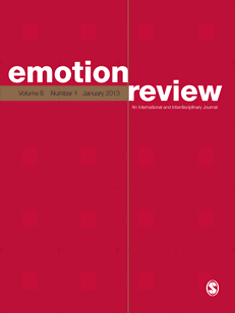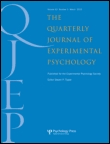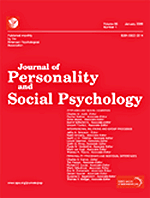
Affective Science
Scope & Guideline
Charting New Territories in Affective Science
Introduction
Aims and Scopes
- Emotion Regulation and Dynamics:
Research in this area focuses on how individuals manage their emotions in response to internal and external stimuli, including the mechanisms of emotion regulation and the dynamics of affective experiences in everyday life. - Social and Interpersonal Emotions:
This scope encompasses the study of emotions within social contexts, including interpersonal emotion regulation, social comparisons, and the impact of social media on emotional experiences. - Developmental Perspectives on Emotion:
The journal explores how emotions develop across the lifespan, particularly in children and adolescents, including the role of parenting, socialization, and cultural influences on emotional development. - Cross-Cultural and Comparative Emotion Research:
Affective Science investigates how emotions are experienced and expressed across different cultures, contributing to a broader understanding of the universality and variability of emotional experiences. - Methodological Innovations in Affective Research:
The journal emphasizes the use of innovative methodologies, such as machine learning, ecological momentary assessment, and neuroimaging techniques, to study emotions and their regulation.
Trending and Emerging
- Digital Emotion Research:
With the rise of social media and digital communication, research exploring the impact of online interactions on emotional well-being and social dynamics is increasingly prominent, reflecting the need to understand emotions in digital contexts. - Interdisciplinary Approaches to Affective Science:
There is a growing trend towards integrating insights from various disciplines, including neuroscience, psychology, and sociology, to create a more comprehensive understanding of emotions and their regulation. - Contextual and Situational Influences on Emotion:
Emerging studies emphasize the importance of context in shaping emotional experiences, focusing on how situational factors, such as social environments and cultural contexts, influence affective responses. - Neurobiological Underpinnings of Emotion:
Research exploring the neural mechanisms of emotion regulation and processing is gaining momentum, highlighting the biological foundations of affective experiences and their implications for mental health. - Complex Emotional Experiences:
There is an increasing interest in studying mixed emotions and the complexity of emotional experiences, moving beyond the dichotomy of positive and negative emotions to understand the full spectrum of affect.
Declining or Waning
- Basic Emotion Theories:
Research focusing solely on basic emotion theories, such as the discrete emotion model, appears to be waning as the field shifts towards more nuanced and integrative models of emotion that account for complexity and context. - Animal Emotion Studies:
Although animal emotion research has been a significant component, recent publications suggest a decrease in focus on comparative studies between human and non-human emotional experiences, possibly due to a growing interest in human-centric emotional dynamics. - Static Emotion Measurement:
There is a noticeable decline in traditional, static methods of measuring emotions (e.g., self-report questionnaires), as newer dynamic and contextual approaches gain traction in the field.
Similar Journals

Social Cognitive and Affective Neuroscience
Leading the Charge in Affective Neuroscience ResearchSocial Cognitive and Affective Neuroscience, published by Oxford University Press, is a leading academic journal in the fields of cognitive neuroscience and experimental cognitive psychology. With an impact factor placing it in the Q1 category across three disciplines, including medicine, this journal stands at the forefront of research, promoting innovative studies that explore the intricate relationship between social processes and neural mechanisms. Since becoming Open Access in 2017, it has enhanced accessibility for researchers worldwide, facilitating the dissemination and discussion of groundbreaking findings. The journal, which has evolved significantly since its inception in 2006, is ranked among the top 10 in experimental and cognitive psychology and is highly regarded within the cognitive neuroscience community, making it a crucial resource for professionals, academics, and students eager to advance their understanding of the neural substrates underlying social cognition and emotion. The editorial board invites submissions that contribute to the interdisciplinary dialogue surrounding these critical areas of research, ensuring that the journal remains a vital platform for scholarly exchange.

Emotion Review
Illuminating the Complexity of Human EmotionEmotion Review, published by SAGE Publications Inc, is a leading international journal that focuses on the multidisciplinary examination of emotional processes across various fields. Launched in 2009 and maintaining a strong presence in the UK, this journal has rapidly ascended to be classified in the Q1 quartile across several categories, including Arts and Humanities (miscellaneous), Experimental and Cognitive Psychology, and Social Psychology. With its outstanding Scopus rankings—evident from its 93rd percentile in Arts and Humanities and 88th percentile in Psychological disciplines—Emotion Review plays a crucial role in advancing the understanding of emotional phenomena, offering a platform for innovative research and theoretical developments. While this journal does not provide open access options, it remains a vital resource for researchers, professionals, and students eager to explore the complexities of emotions and their impact on human behavior, making it an essential addition to any academic library.

EXPERIMENTAL PSYCHOLOGY
Exploring the frontiers of cognitive and experimental psychology.EXPERIMENTAL PSYCHOLOGY is a premier journal dedicated to advancing the field of psychology through rigorous empirical research and innovative theoretical insights. Published by HOGREFE PUBLISHING CORP, this esteemed journal features an array of studies that delve into cognitive processes, experimental methodologies, and the intricate workings of human behavior. With a significant impact factor, EXPERIMENTAL PSYCHOLOGY holds a Q1 ranking in Arts and Humanities and maintains a commendable presence in the realms of Experimental and Cognitive Psychology. By providing Open Access options, the journal ensures that vital psychological research is widely accessible, fostering collaboration and knowledge sharing among researchers, practitioners, and students worldwide. Based in the United States, it has been a cornerstone of psychological literature since 1998, continuing to shape the discourse in its diverse and interdisciplinary scope. Researchers seeking to contribute to or stay informed about the latest advancements in psychological science will find EXPERIMENTAL PSYCHOLOGY an invaluable resource.

QUARTERLY JOURNAL OF EXPERIMENTAL PSYCHOLOGY
Shaping the Future of Psychological ScienceQuarterly Journal of Experimental Psychology, published by SAGE Publications Ltd, is a leading peer-reviewed journal that serves as a vital resource in the fields of experimental and cognitive psychology, neuropsychology, and medicine. With an impactful contribution to psychological research, the journal is recognized for its rigorous methodology and empirical studies, holding a notable ranking among its peers—finding itself in the Q2 quartile across several categories. With its origin tracing back to 2006, Quarterly Journal of Experimental Psychology significantly influences the academic discourse until its latest published findings in 2024. Catering to a diverse audience of researchers, professionals, and students, this journal provides Open Access options, enhancing the reach and accessibility of cutting-edge psychological research. By focusing on innovative approaches and findings, it aims to bridge theoretical understanding with practical application, hence fostering advancement in multiple related disciplines. For those committed to understanding the complexities of human behavior and cognitive processes, this journal remains an essential reference point.

COGNITIVE AFFECTIVE & BEHAVIORAL NEUROSCIENCE
Advancing Insights: The Intersection of Thought, Feeling, and BehaviorCOGNITIVE AFFECTIVE & BEHAVIORAL NEUROSCIENCE (ISSN: 1530-7026, E-ISSN: 1531-135X) is an esteemed journal published by SPRINGER that aims to advance the understanding of the interplay between cognitive processes, affective states, and behavioral responses in the field of neuroscience. Established in 2001, the journal provides a rigorous platform for disseminating high-quality research, with a significant focus on both Behavioral Neuroscience and Cognitive Neuroscience. Classified in Q1 and Q2 quartiles for 2023, it ranks highly within its categories, holding positions of #37 out of 88 and #46 out of 115 respectively in the Scopus listings. Although not an open-access publication, readers can access a wealth of valuable insights and innovative findings that enrich the scientific community's understanding of brain function and behavior. The journal's emphasis on interdisciplinary research contributes to its esteemed reputation, making it a vital resource for students, researchers, and professionals striving to explore the complex nature of the human mind and behavior.

Journal of Rational-Emotive and Cognitive-Behavior Therapy
Empowering Research in Rational-Emotive and Cognitive Therapies.Journal of Rational-Emotive and Cognitive-Behavior Therapy, published by Springer, stands as a significant interdisciplinary forum in the field of clinical psychology and experimental and cognitive psychology. With a history spanning from 1983 to 2024, this journal is dedicated to advancing research and practice encapsulating the principles of rational-emotive therapy and cognitive-behavioral approaches. Acknowledged for its impactful contributions, it holds an impressive Q2 ranking in Clinical Psychology and a Q3 ranking in Experimental and Cognitive Psychology as of 2023. The journal serves an essential role in disseminating evidence-based findings that cater to researchers, professionals, and students alike, fostering a deeper understanding of cognitive processes and emotional regulation. We invite you to explore the latest research and case studies, which contribute to the therapeutic landscape, and deepen your knowledge in this evolving field.

JOURNAL OF PERSONALITY AND SOCIAL PSYCHOLOGY
Pioneering Research in Social Psychology and BeyondJournal of Personality and Social Psychology, published by the American Psychological Association, stands as a premier resource in the fields of social psychology and sociology, offering critical insights into the dynamics of human behavior and interpersonal relationships. With an impressive impact factor and ranked in the top tier of academic journals—Q1 in both Social Psychology and Sociology & Political Science—it consistently attracts high-caliber research submissions that advance theoretical and practical knowledge. Established in 1965, this journal has become a cornerstone for scholars and practitioners alike, facilitating the dissemination of pivotal studies in understanding social influences and individual personalities. As a key player in its field, it is essential reading for anyone involved in psychological research, providing a platform for innovative ideas and comprehensive analyses. Despite its subscription-only access model, its influence is reinforced by its consistently high rankings on Scopus, underscoring its significance by being in the 98th percentile for sociology and the 97th percentile for social psychology. Academics looking to delve into transformative concepts around personality and social interactions will find Journal of Personality and Social Psychology an invaluable addition to their resources.

JOURNAL OF EXPERIMENTAL PSYCHOLOGY-GENERAL
Advancing the Frontiers of Psychological ResearchJOURNAL OF EXPERIMENTAL PSYCHOLOGY-GENERAL, published by the American Psychological Association, is a leading journal in the field of experimental and cognitive psychology. With an ISSN of 0096-3445 and a robust impact factor that reflects its significant contribution to research, this journal serves as a premier outlet for empirical studies that advance our understanding of psychological processes across development and cognition. Covering a wide array of topics from developmental neuroscience to general psychology, it is categorized in the Q1 quartile across multiple fields, making it a vital resource for researchers, professionals, and students alike. The journal has maintained a consistent publication record since its inception in 1975, continuously freeing insights that shape the future of psychology and related disciplines. With rigorous peer review and high standards of scholarly excellence, JOURNAL OF EXPERIMENTAL PSYCHOLOGY-GENERAL remains an essential platform for disseminating innovative psychological research.

PSYCHOLOGICA BELGICA
Advancing psychological knowledge for a brighter tomorrow.PSYCHOLOGICA BELGICA is a distinguished open access journal published by UBIQUITY PRESS LTD, focusing on the broad and diverse field of psychology. Since its inception in 1975, this journal has been dedicated to the dissemination of high-quality research, making it a vital resource for researchers, practitioners, and students alike. With an impact factor that reflects its significant contribution to the field, PSYCHOLOGICA BELGICA stands out in the Q2 category of miscellaneous psychology and is ranked 75th out of 216 journals in General Psychology according to Scopus. The journal's open access model, adopted in 2004, ensures that the latest research findings are freely accessible, promoting a wider engagement with psychological science. With a commitment to fostering academic collaboration and innovation, PSYCHOLOGICA BELGICA continues to be an essential platform for advancing psychological knowledge and exploring contemporary issues within the discipline.

JOURNAL OF PSYCHOPHYSIOLOGY
Decoding the Physiological Foundations of Psychological ProcessesJOURNAL OF PSYCHOPHYSIOLOGY, published by Hogrefe Publishing Corp, serves as a crucial platform for the dissemination of research in the interdisciplinary fields of neuropsychology, physiological psychology, and neuroscience. With an ISSN of 0269-8803 and an E-ISSN of 2151-2124, this journal has been a staple in the academic community since its inception in 1987 and will continue to publish impactful research until at least 2024. Despite the absence of Open Access, the journal maintains a significant presence, holding Q3 and Q4 quartile rankings in relevant disciplines according to the 2023 metrics. Researchers and practitioners benefit from the journal's robust focus on integrating psychophysiological research with practical applications, contributing to a better understanding of psychological processes through physiological insights. As evident from its Scopus rankings, the JOURNAL OF PSYCHOPHYSIOLOGY is dedicated to fostering scholarly dialogue and advancing knowledge in the field, making it an essential resource for anyone invested in the intricacies of human behavior and the physiological underpinnings thereof.